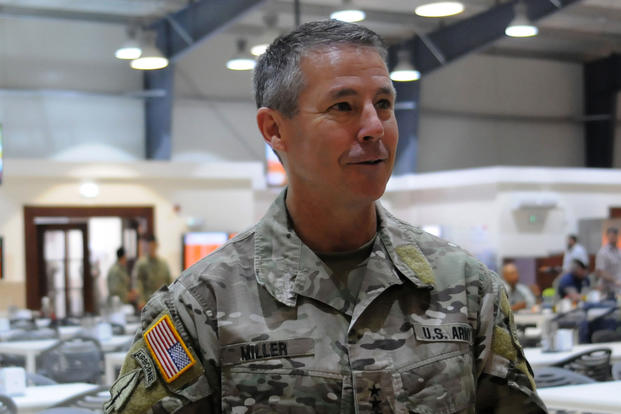Army Lt. Gen. Austin "Scott" Miller, who was a Delta Force captain in the "Black Hawk Down" battle of Mogadishu, has emerged as the top choice to take command of U.S. and NATO forces in Afghanistan from Army Gen. John Nicholson.
The Pentagon has yet to give official confirmation of Miller's nomination, but The Associated Press cited U.S. officials who stated that the 57-year-old career special operations officer would become the ninth U.S. commander in more than 17 years of war in Afghanistan. The choice of Miller was first reported by The Wall Street Journal.
Miller, a 1983 West Point graduate from Hawaii, currently commands U.S. Joint Special Operations Command. He was among the first U.S. troops to enter Afghanistan after the Sept. 11, 2001, terrorist attacks.
He returned to Afghanistan in 2010 to take charge of training and equipping local forces and police, and in June 2013 was in Afghanistan again to command special operations in the country.
His awards include the Distinguished Service Medal, the Defense Superior Service medal, the Legion of Merit, the Bronze Star with combat 'V' device, and the Purple Heart.
As a special operator, Miller's public statements have been few, but one of the exceptions came when he was commander of Army training at the Maneuver Center of Excellence in Fort Benning, Georgia, in 2015.
As such, he had oversight of the Army Ranger School in the historic cycle in which three female officers -- 1st Lt. Shaye Haver, Capt. Kristen Griest, and Maj. Lisa Jaster -- earned Ranger tabs.
Miller went before the microphones to push back against charges that standards had been lowered to allow the women to pass.
"The standards do not change. The rucksacks' weight did not change. They passed with their peers," he said. "I'm the leadership here at Fort Benning. I want people to meet the standards. I think we've shown [the Rangers is] not exclusively a male domain."
If confirmed by the Senate to succeed Nicholson, which would lead to his fourth star, Miller would likely take command later this summer. There are an estimated 14,000 U.S. and 6,400 NATO troops in Afghanistan.
Small elements of U.S. forces have a counter-terror mission in Afghanistan, but the main role of U.S. troops has been in support of the more than 300,000 Afghan National Defense and Security Forces (ANDSF) in the fight against the Taliban and an ISIS offshoot called Islamic State-Khorasan Province, or ISIS-K.
Nicholson took command in Afghanistan in 2016 when the policy of the Obama administration was to continue withdrawing U.S. forces. He called the war a "stalemate" and pressed for additional troops.
President Donald Trump reportedly pushed for Nicholson's removal soon after taking office. But with the backing of Defense Secretary Jim Mattis and Joint Chiefs Chairman Gen. Joseph Dunford, Nicholson succeeded in convincing a reluctant Trump to approve a new strategy last August for Afghanistan that stressed air power and targeting Taliban sources of revenue.
Trump acknowledged at the time that his initial instinct was to order a complete withdrawal of U.S. forces.
Nicholson said in November that U.S. and Afghan forces had "turned the corner" in the fight in Afghanistan that is now focused on driving the Taliban into peace talks. But a series of Taliban attacks and recent reports from the Pentagon's Inspector General, the Special Inspector General for Afghanistan Reconstruction (SIGAR), have questioned the strategy.
In March, at the airfield in Kandahar, Nicholson told The Associated Press that one of the components of the strategy was to convince Taliban fighters that they could return safely to their communities if they put down their arms.
"We have work to do," he said. "Some things need to be put in place to enable this. They need to know they can move back securely, live in safety."
Nicholson has touted the creation of a Security Force Assistance Brigade, made up of volunteer non-commissioned and commissioned officers with combat experience, to partner with Afghan forces in the train, advise and assist role to free up conventional Brigade Combat Teams for other missions.
The first SFAB began arriving in Afghanistan in March, but the concept of the unit's operation was been brought into question in a combined report earlier this week by the Inspectors General of the Pentagon, the State Department and the U.S. Agency for International Development.
The report put in doubt claims of progress by Nicholson and the Afghan central government, and said the presence of the SFAB in the midst of stepped-up Taliban attacks "further raises the risk of civilian casualties, insider attacks, U.S. casualties, and other conflict-related violence."
In response to the report, Army Col. Rob Manning, a Pentagon spokesman, said the Taliban offensives did not detract from the military's overall assessment that the situation on the ground is improving.
"Chaos and progress can co-exist," Manning said. "That's exactly what we feel is happening in Afghanistan."
Miller's background as an operator with elite units including Delta Force could lead to more focus on counter-terror raids in Afghanistan, but his experience as a trainer is likely to have the most impact, said Stephen Tankel, a professor at American University and an adjunct senior fellow at the Center for a New American Security.
However, "there's no magic bullet on the military side" that can deal with the fundamental issues of poor governance in Afghanistan and the hostility of neighboring Pakistan, he said.
"If you don't handle the governance problem, if you don't handle the Pakistan problem," the new strategy won't work, said Tankel, author of the book "With Us and Against Us: How America's Partners Help and Hinder the War on Terror."
Nicholson has been upfront on the difficulties of the task that he will be handing over to Miller.
In a March interview with Politico, Nicholson said, "As difficult as it is to see this war go on for so long, we're still protecting the country and we're doing it with a fraction of what we once invested here."
He added, "We're doing it with an Afghan army that was created literally from nothing, that is now doing the fighting.
"Yes, it's been a long time. Yes, it's been costly," Nicholson said, "but the costs of 9/11 were enormous, and there are people here who harbor those ambitions" to strike again.
-- Richard Sisk can be reached at Richard.Sisk@Military.com.






























